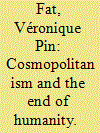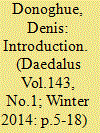|
|
|
Sort Order |
|
|
|
Items / Page
|
|
|
|
|
|
|
| Srl | Item |
| 1 |
ID:
124422


|
|
|
|
|
| Publication |
2013.
|
| Summary/Abstract |
The academic discipline of International Relations has yet to systematically begin tracing the impact of posthumanism on ethics in global politics. In a context where a humanist picture of the subject is in "a state of crisis that is more acute than ever," and the "end of humanity" is being declared by some, the question arises as to whether a moral commitment to liberal cosmopolitanism can be maintained. It arises because the moral commitments of cosmopolitanism traditionally rest on a humanist foundation, and posthumanism, at first glance, seems an obvious threat to it. In this article, rather than reading posthumanism as a threat to humanity, I read humanism as the threat. I propose that, tricky though it may be, a cosmopolitanism that embraces the end of humanity can be formulated and defended as a moral commitment to humanity: a cosmopolitanism without foundations. This cosmopolitanism without foundations is, I suggest, one way to overcome the skeptic's fantasy that we are hidden from each other, and with it the belief that our primary relation to the world is one of knowledge anchored to foundational promises of certainty. Instead, a life lived in the world with others is proposed, and with it a cosmopolitan commitment to humanity as an unavoidable ethical responsibility.
|
|
|
|
|
|
|
|
|
|
|
|
|
|
|
|
| 2 |
ID:
128287


|
|
|
|
|
| Publication |
2014.
|
| Summary/Abstract |
It is a minor embarrassment that the words humanist and humanism are regularly found on the same page of big dictionaries. I should say at once, therefore, that the contributors to this issue of Dædalus are humanists because they work on the humanities and teach them, often under conditions that seem unpropitious, in colleges and universities. What they are otherwise, in their personal and social lives, is none of my business. Humanism raises a different issue. The Oxford English Dictionary gives ½ve meanings of it, in notably awkward phrasing. The predominant one refers to a tenet, an axiom, or a prejudice-depending on one's viewpoint-in the history of philosophy: A pragmatic system of thought introduced by F. C. S. Schiller and William James which emphasizes that man can only comprehend and investigate what is with the resources of the human mind, and discounts abstract theorizing; so, more generally, implying that technological advance must be guided by awareness of widely understood human needs. In some contexts, humanism has taken on
|
|
|
|
|
|
|
|
|
|
|
|
|
|
|
|
|
|
|
|
|